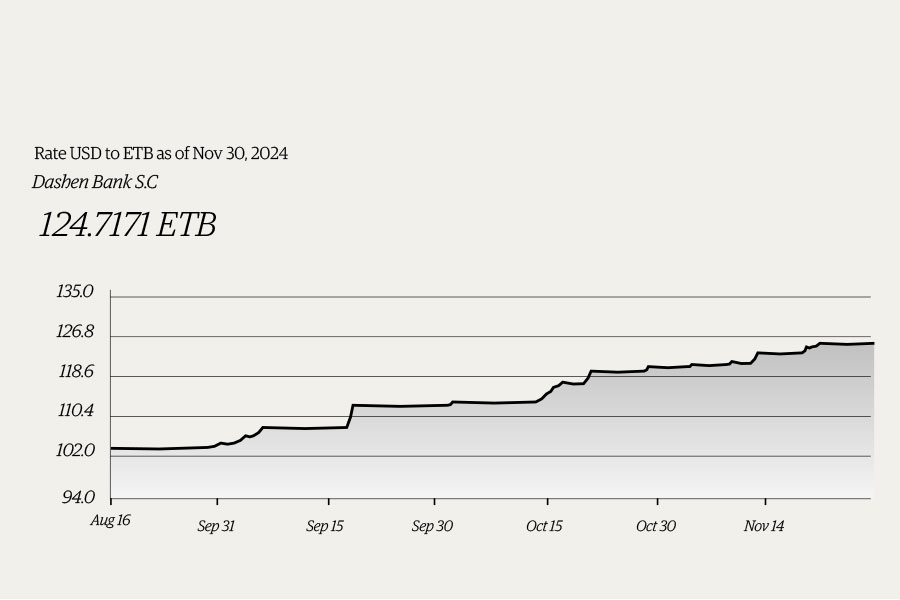
Viewpoints | Jul 20,2024
For Abiy Berhanu, the owner of HPC Chemicals & Machineries, an import firm, business has been good until recently.
Since the end of January his business has slowed down because of the outbreak of the Novel Coronavirus, a virus that originated in China and has spread across the globe. The first case of the virus was reported on December 31, 2019, and since then it has infected 102,469 people and has killed 3,491 as of March 7, 2020.
Abiy, who employs nine people, imports machinery for factories and chemicals and ingredients that are used for cosmetics and food items. He started the business five years ago by importing 70pc of his cargo from China.
The items he is importing from Wuhan, China, the city where the first case of the virus was reported, will arrive at least three months late.
"We can't load goods, especially after the Chinese New Year [celebrated on January 25th, 2020]," he said. "We have to be on the spot when our products are loaded, but we can't do that because of the current health issue."
Abiy, who received five orders in a month, considers himself lucky if he gets one order a month since the outbreak of Novel Coronavirus.
He also had to delay delivery of a second shipment, which was expected to arrive in February, by four months. In addition to this, he is waiting for engineers from China to install machinery in a new factory that processes animal food products, which is being built in Dukem, some 40Km west of the capital.
The machinery was imported on the eve of the announcement of the outbreak of the virus, but the Chinese engineers have still been unable to come and install the equipment.
"When we open Letters of Credit (LC), we have to pay a five percent additional cost," he said with frustration. He fears that the situation will only get worse for the next three or four months, making it difficult for him to go to China and load his goods.
"Currently, we can't place orders and go there to select the materials," he adds. "Because of the virus, our income has decreased by 50pc."
He shifted his business to Italy in order to serve his customers, but the virus has spread there too, delaying his cargo. Instead of arriving next week as scheduled, his shipment from Italy will be held up at least six months. All told, he has three detained shipments scattered across the world. India may be able to deliver what he needs.
"Because the shipments are postponed," he said, "I have lost at least two million Birr in the past three months."
Ethiopian Cargo & Logistics Services employees unload cargo that came from China on March 7, 2020.
Even though Ethiopian Airlines expressed its determination to continue flights to China. The amount of cargo that it carries from China showed a considerable decline due to the virus. Previously, the airline scheduled 28 cargo flights to China and Hong Kong each week, but that number has decreased to 20 since the outbreak.
According to data from the Ethiopian Customs Commission, the weight of goods imported from China between September and November 2019 was 9.1 million kilograms. In the past two months, only 60,790Kg have been imported.
Currently, there are 1,000 employees who provide cargo and logistics services at the airline, working as cart operators, cargo handlers, forklift drivers, and back-office and sales staff.
"Our employees take extra caution when they process cargo from China,” said Fitsum Abadi, managing director of Ethiopian Cargo & Logistic Service, that carried 432,000tn of cargo in the last fiscal year.
To protect themselves from the virus, the employees are geared up with face masks and gloves supplied by the airline. The gear will be burned right after staff are finished with their operation, according to Fitsum.
"The amount of cargo that comes from China has decreased, because many of the production companies in the country are closed," Fitsum said.
Even though Ethiopian Airlines is continuing regular flights to its five gateways in China - Beijing, Shanghai, Guangzhou, Chengdu and Hong Kong - the number of passengers has seen a considerable drop, according to the CEO of the airline.
"The air travel demand for Ethiopian Airlines has declined by 20pc due to the Coronavirus," Tewolde G.Mariam, the CEO, told Reuters.
Last week, the CEO sent an alert message to the employees of the airline, saying, "We're in one of the most challenging times in the airline industry."
All airlines, Ethiopian included, are fighting for their own survival, according to Tewolde.
"We're an airline who has survived all kinds of life-threatening challenges, and we have long time experience on how to navigate strong perfect storms[,] and we are sure we will survive this one too," reads his email, "but we need to double and triple our efforts now for our own survival."
To survive the season, the airline is cutting its flight capacity by more than 20pc, scaling up cost-saving and cost-cutting programmes and asking service providers for temporary relief, reductions, discounts and waivers. It has also started to renegotiate all contracts, including aircraft leases as well as scaling down the size of offices and reducing staff.
The warehouse of Abiy Berhanu, the owner of HPC Chemicals & Machineries, is less stocked than usual following the outbreak of Novel Coronavirus.
Afraid of the virus’ severity, many countries and airlines have started banning travel to China. Air Canada, American Airlines, British Airways, Delta, Lufthansa, Emirates, Etihad Airways and Qatar Airways have already suspended all flights to and from mainland China.
According to data from the Ethiopian Immigration, Nationality & Vital Events Agency, 2,031 passengers arrived from China between December 2019 and February 2020. Of those passengers, 961 were registered in December.
The total number of passengers who stepped on board one of Ethiopian's aircraft in 2019 was 12.1 million.
Ethiopian Cargo & Logistics Services, the largest cargo network operator in Africa, currently works with 58 cargo destinations in Africa, the Gulf, the Middle East, Asia, Europe and North America with an average daily uplift of over 650tn aside from the belly-hold load of over 200tn, according to its January 2020 report.
Ethiopian Airlines, the national air carrier, has increased its profits by 19pc to 232 million dollars in the 2017/18 fiscal year and has transported 340,000tn through its cargo services. Ethiopian Airlines has more than 100 international destinations, 19 domestic routes and 39 freighters.
The nation’s total merchandise import bill reached 15.1 billion dollars in the last fiscal year.
Out of the total imports to Ethiopia in the last fiscal year, Asia accounted for 62.3pc. The principal imports from China accounted for 41.7pc, while Kuwait, India and the UAE represent 17.6pc, 13.1pc and 5.8pc, respectively. The share of Ethiopia's imports from Europe was 21.4pc, with Turkey covering 18.7pc, Belgium 10.6pc, Italy 10.6pc, United Kingdom 10.1pc and Germany 9.9pc.
Though the virus has not been reported in Ethiopia, the Ethiopian Public Health Institute (EPHI) has deployed 200 medical staff to conduct tests on passengers, especially those who arrive from countries that are infected by the virus.
So far, 25 people have been quarantined out of concern that they were infected with the virus. One of the passengers is Chinese, while the remaining are Ethiopians who flew in from countries where the virus has spread.
Out of the total quarantined, 24 have tested negative, while one individual is still in the process of being tested. So far 6,156 passengers were scanned at Bole International Airport, and 902 people have been selected for follow-up observation, because the virus takes 14 days to incubate before the infected person develops symptoms. So far, 762 people have completed the follow-up period without showing symptoms.
Patients infected with the virus experience fever, cough and shortness of breath. Avoiding close contact with people suffering from acute respiratory infections, washing hands with soap and water for at least 20 seconds, and avoiding touching the eyes, nose and mouth with unwashed hands are some of the preventive measures to halt the spread of the respiratory virus.
In the event of an outbreak, the Institute has established national emergency centres at Ethiopian Airlines, Tikur Anbessa, St. Paul and Kotebe hospitals to keep suspected patients in isolation.
"Considering the damage the virus might cause, we'll increase the number of isolation centres in the capital," said Feyisa Regassa (M.D), the international health regulation national focal person at the Institute, which started testing samples locally four weeks ago.
Currently, the Institute has decided to establish an isolation centre in all the regional states, according to Feyisa.
The Institute also dispersed 3,000 N95 masks, safety devices that cover the nose and mouth and protect the wearer from breathing in some hazardous substances. It also distributed 300 personal protection devices to the regional states.
Apart from Bole International Airport, the Institute is carrying out screenings at 29 border stations along with Dire Dawa International Airport and Dewele border crossing.
The WHO has raised its assessment of the spread and impact of the virus and estimates the risk to be very high at the global level.
There are 115 countries that have not detected any cases, and of the 75 countries with cases, 47 have reported less than 10 victims. More than 130,000 people have been trained in various aspects to respond to the virus.
Alemayehu Geda (PhD), a macroeconomist and lecturer at Addis Abeba University, believes that the virus will have a significant impact on the economy, since Ethiopia imports many goods from China.
It is not easy to shift to other markets, as the business relations with China are well established, and it offers the products at lower prices, according to Alemayehu.
"The situation will continue at least for the coming four months,” predicts Alemayehu, adding that the virus will effect the local economy and the rest of the continent, since China dominates African markets.
These kinds of outbreaks could happen anytime, and it would be better for the country to focus on developing the manufacturing industry to substitute for imports, Alemayehu advised.
The virus is already effecting the economy. The United Nations Economic Commission for Africa (UN-ECA) announced the postponement last week of all public meetings, including the 2020 Conference of Ministers of Finance, Planning & Economic Development.
"Following global health concerns pertaining to the Coronavirus and the need for added vigilance, upon consultation with partners, the ECA will postpone all public meetings until further notice," reads the statement from the ECA.
Abiy, who is on the verge of losing his business, hopes the virus will be controlled very quickly.
PUBLISHED ON
Mar 07,2020 [ VOL
20 , NO
1036]

Viewpoints | Jul 20,2024

Commentaries | May 11,2024

Commentaries | Feb 03,2024

Money Market Watch | Dec 01,2024

Viewpoints | May 02,2024

Fortune News | Oct 21,2023

Covid-19 | Mar 21,2020

Commentaries | Aug 06,2022

Commentaries | Apr 25,2020

Agenda | Oct 23,2021

Dec 22 , 2024 . By TIZITA SHEWAFERAW
Charged with transforming colossal state-owned enterprises into modern and competitiv...

Aug 18 , 2024 . By AKSAH ITALO
Although predictable Yonas Zerihun's job in the ride-hailing service is not immune to...

Jul 28 , 2024 . By TIZITA SHEWAFERAW
Unhabitual, perhaps too many, Samuel Gebreyohannes, 38, used to occasionally enjoy a couple of beers at breakfast. However, he recently swit...

Jul 13 , 2024 . By AKSAH ITALO
Investors who rely on tractors, trucks, and field vehicles for commuting, transporting commodities, and f...

Jun 28 , 2025
Meseret Damtie, the assertive auditor general, has never been shy about naming names...

Jun 21 , 2025
A well-worn adage says, “Budget is not destiny, but it is direction.” Examining t...

Jun 14 , 2025
Yet again, the Horn of Africa is bracing for trouble. A region already frayed by wars...

Jun 7 , 2025
Few promises shine brighter in Addis Abeba than the pledge of a roof for every family...